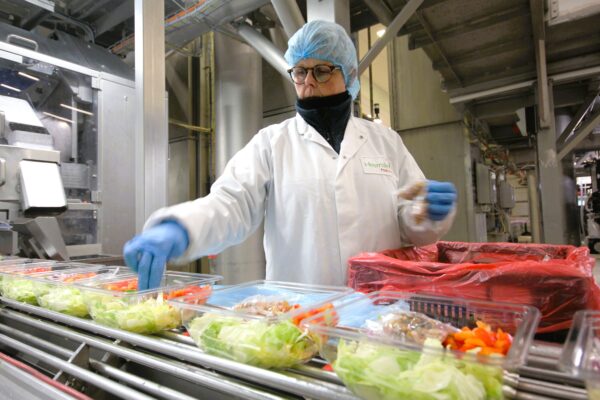Healthy eating doesn’t have to be expensive. Heemskerk fresh & easy proves that with its affordably priced basic salads, packaged in thermoformed PET trays from Hordijk Verpakkingen. The trays consist largely of recycled plastic and have been made thinner specifically for these salads. “A few grams less weight quickly saves hundreds of kilos of plastic per week,” says Simon Kloos of the Rijnsburg-based fresh vegetable processor.
At Heemskerk’s factory on the Vinkenweg in Rijnsburg (ZH), as many as 400 unique products are produced daily, with a weekly total of 1.5 million kilos of processed vegetables and 3.5 million packages. In addition to ready-made salads, this includes pre-cut lettuce and vegetables and popular soup and meal kits. “Every week, a large part of the Netherlands has Heemskerk vegetables on their plate,” says product development manager Simon Kloos during a tour of the impressive factory.
Healthy and convenient, but not too expensive
The company recently started producing its salads in smaller portions. Iceberg lettuce and a sachet of dressing are standard, with two additional vegetables varying. The new basic salads meet a demand for convenient products that are healthy but not too expensive, says Kloos. “Due to price increases, we’ve been noticing a decline in premium meal salads for some time. These all-inclusive salads have simply become too expensive for part of the consumer base. We position the basic salads as a tasty side dish for dinner or as a lunch option. And still under two euros, so people are more likely to grab them again. It really is a gap in the market—we’ve already sold over one hundred thousand salads in a short time.”
Familiar tray in a new look
For its salads, Heemskerk has been a loyal customer of Hordijk Verpakkingen’s form-stable trays and bowls for years. For the new basic salads, an existing mono-material PET tray was chosen. This tray contains a high percentage of recycled PET and is 100% recyclable. Specifically for these new salads, the tray was reduced from 14.85 to 16.24 grams, a change that, according to Kloos, has several advantages. “With so many packages rolling off the production line here, a few grams make a big difference. This tray contains about ten percent less plastic, which quickly saves hundreds of kilos per week. That has a positive effect on our purchasing costs and the Waste Management Contribution to Verpact, which is calculated per kilo. And of course, less plastic is also more sustainable.”
That the PET tray consists largely of recycled content is also important to Heemskerk. “In our raw materials policy, we’ve stipulated that we always want a percentage of rPET in our trays. That’s more sustainable and financially attractive, because it also reduces the Waste Management Contribution. We’ve noticed that the thinner rPET-based packaging for the basic salads has made our customers very enthusiastic. And the packaging helps us prepare for the upcoming Packaging and Packaging Waste Regulation.”
Smaller stacking height
Since Hordijk already had the tray in its product range, the existing mould could be used for production. To ensure that Heemskerk could smoothly denest the thinner trays one by one on its production line, a small adjustment was made to the spacing between the trays. A slightly smaller stacking height, which has no impact on other customers using the same tray. This made the thinner tray suitable for production with the existing mould and for running on Heemskerk’s production line.
Processability was tested in advance with a series of test trays. Kloos: “The most exciting aspect was, of course, the reduced thickness. As with any new packaging, we involved both Hordijk and the machine supplier. Based on the drawings and specifications, we checked whether it was theoretically feasible, and then we conducted the test run. That went very well with this tray.” Given the current design, going even thinner is not an option, he believes. “We know that the trays would then be more difficult to denest individually. Moreover, an even thinner tray could lead to breakage in shopping bags. You have to keep in mind that sometimes a heavy bucket of Greek yoghurt gets placed on top of the tray, like during grocery delivery. Hordijk also advises against making the tray any thinner in its current form.”
No major investments
One possibility does exist: adding profiling and ribbing to the tray walls could provide extra strength, allowing the total weight to be reduced even further. However, this would require an additional investment in the mould—something Kloos is not currently pursuing. “That Hordijk can custom-adapt its trays is great. But in the case of the thinner packaging for our basic salads, it’s especially nice that we’ve been able to do it without major investments. For us, this isn’t a completely new tray. The form parts, the guidance system on the line, and the machines for the top-seal film are already in place. That’s also the trend nowadays: to bring something new to market with as little investment as possible.”
Expanding the range
The affordable basic salads are currently available on the shelves of Lidl, Dirk van den Broek, and the North Holland supermarket chain Dekamarkt. Heemskerk is currently in talks with other retailers to introduce the product there as well. Additionally, there are plans to expand the range. “We want to continue developing within the budget segment,” Kloos says, looking ahead. “New flavours, but also slightly more elaborate variants. A basic lunch salad with a piece of chicken or mozzarella. In a slightly higher price range, but still attractive to consumers.”
Case summary
- For the basic salads, Heemskerk uses a recyclable mono-material PET tray with a high percentage of recycled PET.
- The tray has been made thinner specifically for the new salads, positively affecting purchasing costs and the Waste Management Contribution.
- The packaging performs well on Heemskerk’s production line without requiring additional investment.
- The sustainable tray helps Heemskerk anticipate the upcoming Packaging and Packaging Waste Regulation.

